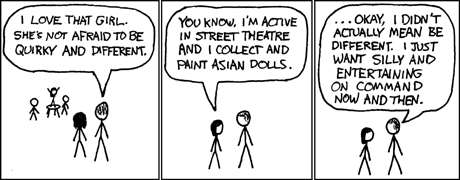Difference between revisions of "122: Quirky Girls"
m (fixed grammatical errors) |
m |
||
| Line 8: | Line 8: | ||
==Explanation== | ==Explanation== | ||
| − | This is a fairly classic play on what people say they want isn't always what they mean they want. As per the comic, this is particularly true when it comes to the | + | This is a fairly classic play on what people say they want isn't always what they mean they want. As per the comic, this is particularly true when it comes to the generalization of wanting someone "different." When [[Megan]] opens up to the other character and says how she is "different," she is met with a stereotypical, but more accurate, response of his definition of "different." |
The title text refers to characters in the famously cliched plot lines of romantic comedies where often the male lead is "uptight" and the female lead is "quirky," and the course of the plot involves the male lead learning to loosen up in order to properly fall in love with the female lead (the same set-up with the genders reversed is also common). Since these movies tend to follow very strict conventions, the definitions of "uptight" (has an office job, is afraid of confronting his boss, timid in public venues, etc.) and "quirky" (abnormally friendly with strangers, loves art, isn't afraid to make a spectacle of herself for fun, etc.) are just as limited and stereotyped as any other characters. This mirrors [[Megan]]'s frustration that "acceptably quirky" is so narrowly defined. | The title text refers to characters in the famously cliched plot lines of romantic comedies where often the male lead is "uptight" and the female lead is "quirky," and the course of the plot involves the male lead learning to loosen up in order to properly fall in love with the female lead (the same set-up with the genders reversed is also common). Since these movies tend to follow very strict conventions, the definitions of "uptight" (has an office job, is afraid of confronting his boss, timid in public venues, etc.) and "quirky" (abnormally friendly with strangers, loves art, isn't afraid to make a spectacle of herself for fun, etc.) are just as limited and stereotyped as any other characters. This mirrors [[Megan]]'s frustration that "acceptably quirky" is so narrowly defined. | ||
==Transcript== | ==Transcript== | ||
| − | :[Megan and a man with a thinning head of hair are talking, looking at a group of | + | :[Megan and a man with a thinning head of hair are talking, looking at a group of two men and a woman standing further away. The woman is on a table and the two men are looking at her.] |
:Guy: I love that girl. She's not afraid to be quirky and different. | :Guy: I love that girl. She's not afraid to be quirky and different. | ||
:Megan: You know, I'm active in street theatre and I collect and paint Asian dolls. | :Megan: You know, I'm active in street theatre and I collect and paint Asian dolls. | ||
Revision as of 12:27, 4 June 2020
| Quirky Girls |
 Title text: Romantic comedy heroines, I'm talking to you. |
Explanation
This is a fairly classic play on what people say they want isn't always what they mean they want. As per the comic, this is particularly true when it comes to the generalization of wanting someone "different." When Megan opens up to the other character and says how she is "different," she is met with a stereotypical, but more accurate, response of his definition of "different."
The title text refers to characters in the famously cliched plot lines of romantic comedies where often the male lead is "uptight" and the female lead is "quirky," and the course of the plot involves the male lead learning to loosen up in order to properly fall in love with the female lead (the same set-up with the genders reversed is also common). Since these movies tend to follow very strict conventions, the definitions of "uptight" (has an office job, is afraid of confronting his boss, timid in public venues, etc.) and "quirky" (abnormally friendly with strangers, loves art, isn't afraid to make a spectacle of herself for fun, etc.) are just as limited and stereotyped as any other characters. This mirrors Megan's frustration that "acceptably quirky" is so narrowly defined.
Transcript
- [Megan and a man with a thinning head of hair are talking, looking at a group of two men and a woman standing further away. The woman is on a table and the two men are looking at her.]
- Guy: I love that girl. She's not afraid to be quirky and different.
- Megan: You know, I'm active in street theatre and I collect and paint Asian dolls.
- Guy: ...Okay, I didn't actually mean be different. I just want silly and entertaining on command now and then.
Discussion
I'll just leave this link to ManicPixieDreamGirl here: [1]198.41.243.5 12:47, 19 July 2015 (UTC)
One of the few tropes that have a Wikipedia article. Nafedalbi (talk) 14:32, 25 April 2022 (UTC)Nafedalbi
Does anyone know who "Guy" is? Explainyourself (talk) 03:29, 31 October 2025 (UTC)